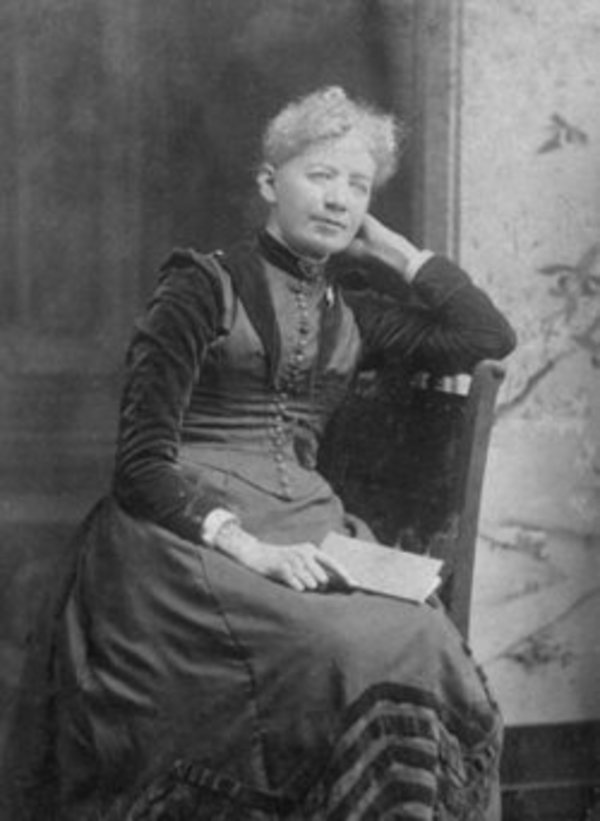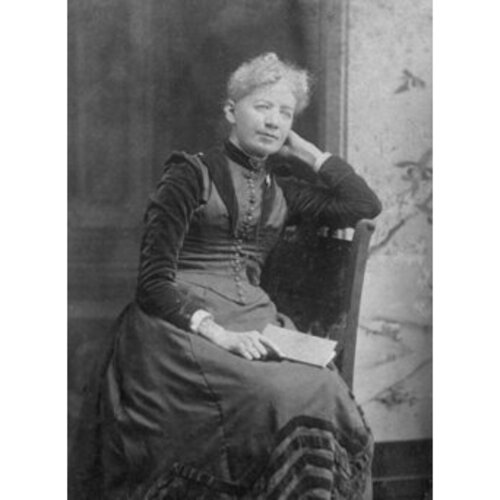
Source: Link
BOWES, SARAH, teacher, lay preacher, temperance reformer, and mission worker; b. 28 June 1834 near Milton, Upper Canada, third daughter of Thomas Bowes and Dorothy Willmott; d. unmarried 12 Sept. 1911 in Milton.
Of Irish-English parentage, Sarah Bowes was raised near Milton on the family farm, Maplehill. During her early life she lived at home while teaching public school; according to obituaries, for a time in the 1860s she and her sister Dorothy conducted a private school for girls in the temperance hall in Milton. Members of a strongly Methodist family, Sarah and at least two sisters appear to have become deeply engaged in church-related activity. Bowes joined the Woman’s Christian Temperance Union soon after its founding [see Letitia Creighton*] and was a delegate at its second annual meeting, in 1878. She was the WCTU’s provincial organizer in 1885 and in 1886, when she was made a fraternal delegate to the convention of the National WCTU, in the United States. For Sarah, who was free of filial obligation after the death of her father in 1881 and her mother three years later, such participation was to be her calling.
Around 1886 Bowes, then in her mid fifties, moved to the newly incorporated city of Vancouver, where, under the auspices of Homer Street Methodist Church, she became a “city missionary . . . visiting in the homes, especially those of newcomers; encouraging and inspiriting mothers, urging upon the families a faithful attendance on the service of the churches to which they owe allegiance; finding out the needy, and reporting such cases to those who can render relief.” Fellow church members also remembered Bowes for her preaching. As part of this work she taught at the Chinese school established by the Homer Street Church; in a directory of 1889 she is listed as a teacher boarding at the church’s parsonage.
Bowes’s primary institutional allegiance was to the WCTU, which had been introduced in British Columbia in 1883 [see Catharine Morton*]. From the time of the provincial union’s convention of 1887, which Bowes attended as delegate for New Westminster, she played an active role. At various conventions she conducted devotional and memorial services, and she presented at least two popular lectures, “The juggernaut of Christendom” in 1887 and “Labour and greatness” in 1890. As well, at some point in the 1890s she wrote and published a small monthly for the WCTU entitled Home Cheer.
From 1889 to 1893 Bowes was the provincial union’s mainland organizer, work that she sometimes found frustrating. Although she proudly announced to the conference of the Dominion WCTU in 1893 that British Columbia boasted 8 unions with over 340 members, she admitted to the provincial conference that no new unions had been established on the mainland that year. Subsequently, from 1894 to 1900, Bowes served as provincial superintendent of a new WCTU department, missionary work, and in 1899 she was also superintendent of the department of prison work. In 1897, when she attended the conventions of the Dominion and the World’s WCTU in Toronto, she had been appointed superintendent of missionary work for the world body.
Within her own local union, the Vancouver WCTU, Bowes served on the executive – she was president in 1888–90 – and worked directly with the public. As a visitor to the City Hospital, she handed out religious literature, wrote letters and held gospel and temperance meetings for patients, attended Sunday services, and in 1894 would give no fewer than “118 personal talks on salvation.” According to the Christian Guardian (Toronto), “Her inspirational power in a meeting was tremendous.” In 1892 she represented the Vancouver union on the women’s committee of the Protestant Children’s Home, also known as the Alexandra Orphanage. After the committee had fired the home’s first matron but could not find a replacement, Bowes agreed to become matron on a trial basis; it is not known how long she held the position. About 1894 she took on the demanding task of matron of the WCTU’s Refuge Home in Victoria but she soon left to become matron at the Victoria court-house.
The indomitable Bowes belonged to several other interrelated women’s groups. She was active in the 1890s in the Young Women’s Christian Association, in which she established a branch of the WCTU and conducted Bible-study groups. In 1895–99 the national body of the Woman’s Missionary Society (the major women’s organization of the Methodist Church of Canada) sponsored her as an urban missionary in Victoria, work that included, at least in 1896–99, being matron of the Victoria Oriental Rescue Home for girls and young women. Many of them stayed there while their mothers or husbands worked, but at the same time so many tried to leave that Bowes had barbed wire placed on the home’s fence.
Between 1904 and 1909 Bowes’s name appears on the rolls of the British Columbia branch of the WMS and she was a popular speaker at its annual conventions. Her duties evidently entailed some travel: at the meeting of 1909 she stated that she needed no reimbursement for her expenses since it was her Christian duty to give “one fifth of any income to charity.” In 1910, as a member of the Local Council of Women in Vancouver and the convenor of its committee of laws, she helped prepare a report on the Girls’ Industrial School, and met with the University Women’s Club for a joint venture regarding “laws for the better protection of women and children.” In addition, that same year she was on the council’s reception committee and conducted devotional exercises for the organization’s provincial conference.
Bowes attended her last meeting in British Columbia in September 1910. The Vancouver Local Council of Women presented her with an “Indian basket, a slumber rug, and a bunch of sweet peas.” Overcome, Bowes thanked the council for its “kind thought” and said “she was sorry to go from her dear Vancouver.” At the age of 76 she had decided to return to Milton to care for her ailing sister Dorothy, wife of Methodist minister John C. Willmott (another sister, Margaret Taylor, was married to John’s brother James Branston Willmott, a prominent Methodist layman); she was also concerned, apparently, about her own “gathering infirmities.” At the Willmotts’ home a year later “the gates opened, and she went in to see the King.” Sarah Bowes was buried nearby in the cemetery of Bowes Methodist Church.
AO, F 885, MU 8404.5, 8406.8; F 977, Bowes United Church cemetery (Trafalgar Township, Ont.), no.73 (mfm.). BCARS, H/D/R57/B672, Bowes to Ebenezer Robson, 17 March 1896. City of Vancouver Arch., Add. mss 54 (J. S. Matthews coll.), .00403; Add.
Cite This Article
Susan J. Johnston, “BOWES, SARAH,” in Dictionary of Canadian Biography, vol. 14, University of Toronto/Université Laval, 2003–, accessed January 1, 2026, https://www.biographi.ca/en/bio/bowes_sarah_14E.html.
The citation above shows the format for footnotes and endnotes according to the Chicago manual of style (16th edition). Information to be used in other citation formats:
| Permalink: | https://www.biographi.ca/en/bio/bowes_sarah_14E.html |
| Author of Article: | Susan J. Johnston |
| Title of Article: | BOWES, SARAH |
| Publication Name: | Dictionary of Canadian Biography, vol. 14 |
| Publisher: | University of Toronto/Université Laval |
| Year of publication: | 1998 |
| Year of revision: | 1998 |
| Access Date: | January 1, 2026 |



